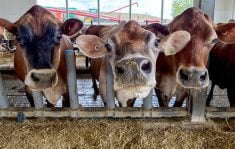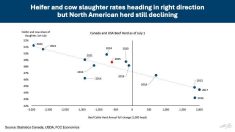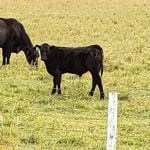Pork producers may soon have a powerful new tool in the fight against porcine epidemic diarrhea or PED.
The Vaccine and Infectious Disease Organization’s International Vaccine Centre at the University of Saskatchewan, better known as VIDO-InterVac, is waiting for final approvals from the Canadian Food Inspection Agency (CFIA) to begin clinical trials of a vaccine targeting four key strains of the PED virus.
“We hope to have it out in the field in the next month or two,” said Andrew Potter, VIDO-InterVac director and CEO.
Read Also

CFIA red tape changes a first step: agriculture
Farm groups say they’re happy to see action on Canada’s federal regulatory red tape, but there’s still a lot of streamlining left to be done
“We need to show there is something here that does work, and we must show it’s safe,” said Potter. “Their prime concern is making sure that if it goes out into the field that you don’t end up with an epidemic of PED, so safety is the big concern.”
To date, testing has shown the vaccine can reduce mortalities at least 90 per cent.
“Sometimes it will be 100 per cent in one trial, it might be 95 per cent in another trial, but it is very, very effective, and I expect that when it’s taken in the field that efficacy will actually increase,” said Potter.
The prospect of a PED vaccine is a welcome one for Manitoba producers.
“This is a huge move forward if it all pans out, and the initial work sounds very, very promising,” said Andrew Dickson, general manager of the Manitoba Pork Council. “If the trials all prove positive… it’s my view that there will then be a very rapid uptake of this vaccine by the industry in Canada — and in North America.”
Unlike earlier vaccines developed in the United States, this vaccine is a prophylactic aimed at preventing the disease altogether, Potter said.
“The U.S. vaccines are available in Canada, but they’re only recommended for use in the case of an outbreak,” he added. The VIDO-InterVac vaccine is administered to sows, which pass antibodies on to their offspring through milk and colostrum.
It’s hoped that clinical trials will answer questions about how long the vaccine remains effective, said Dickson.
And if trials go as planned, Potter said the vaccine could be available to producers as early as next summer. While high-risk locations would likely be first to jump on the vaccine, all producers can benefit from it, he added.
“From my perspective, vaccines are most effective when you can cover as much as possible of the population,” said Potter. “My bias is that you should use it as broadly as possible so that in fact the virus doesn’t circulate, other people might view that a little bit differently.”
Currently there are no active cases of the disease in Canada, which has had a total of five outbreaks to date. But Dickson points out the virus is still circulating south of the border, where millions of pigs died as a result of the virus last year.
“It is widespread,” he said. “But the reason we haven’t had a bunch of cases, in say Western Canada, is that we have very strong biosecurity measures in place.”
The spread of the virus has also been slowed by drier weather.
“Our impression of this virus — and we’re always learning more about it — is that it tends to spread when conditions are wet, in the fall and spring,” Dickson said. “And once it gets into a barn, it tends to sort of follow people from one barn to another, so far we’ve been very lucky in Manitoba. This, hopefully, will be another tool for producers.”















